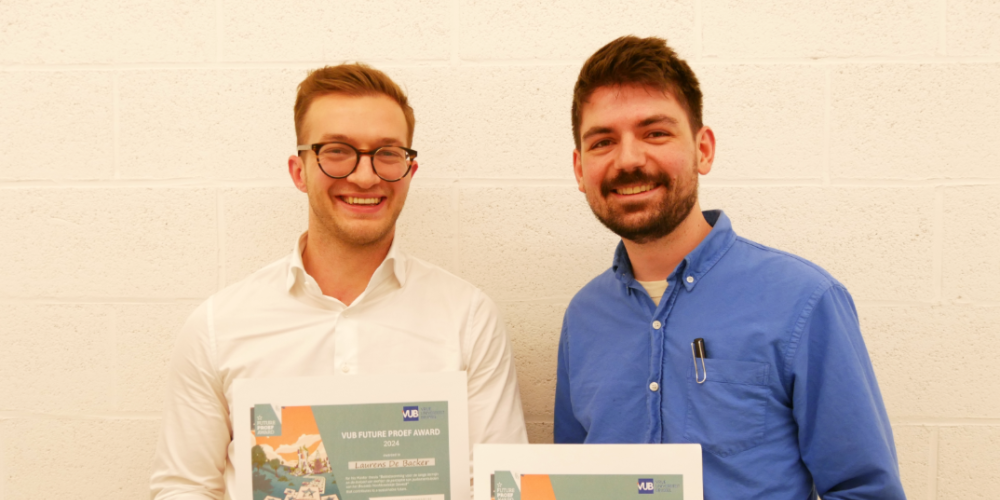
Three VUB students were selected for the Flemish Future Proef Awards – and one of them has made it to the finals. Jonas Görgen, a student in Urban Design and Spatial Planning, wrote his thesis on the energy transition in Brussels. The award ceremony takes place in Mechelen on 24 April.
This is the second edition of the Future Proef Awards, which celebrate theses that focus on impact and sustainability. Whether Jonas will take home the prize? We’ll find out on 24 April during the Future Proef Awards 2025 in Mechelen.
Curious how to tackle a thesis on sustainability? We spoke to two nominated students – Jonas Görgen and Laurens de Backer – about their research, how they worked with stakeholders, and their advice for future thesis writers.
Can you briefly explain your thesis and what motivated your topic?
Jonas Görgen - Pipe Dreams or true transition? A research by design perspective on the energy transition in Brussels :
“I’m very passionate about energy and the energy transition – or is it a transition? That’s debatable. People often think it’s easy: solar panels, electric cars, a battery in the garage. But how is that going to happen in Brussels, especially in the most socially challenged neighborhoods? If it should work for everyone, it needs to work there too. I studied Cureghem to see if the energy transition could be spatially and socially implemented in such a complex environment. And if not, what are we going to do about it? What is the alternative to just leaving them behind? “
Laurens de Backer - Long-term policy-making and the influence of age: the perception of members of parliament of the Brussels-Capital Region:
“My thesis was about the barriers to long-term policymaking and whether a politician’s age affects their outlook. Many issues like climate change are long-term, yet parliaments often work on a short-term basis. In my research, I focused on the parliament of the Brussels-Capital Region, a complex context with several languages and parties. I interviewed 23 Brussels parliamentarians to uncover what barriers exist and explored potential innovations to improve future-proof policymaking. Surprisingly, age did not seem to affect long-term thinking. The obstacles I identified were electoral pressure and the short-term nature of media and politics.”
How did sustainability play a role in your research?
Jonas: “I started with a plan to focus on spatial aspects, but quickly realized I’d miss out on 80% of the relevant context. Sustainability can’t be narrowed down to one dimension—it’s social, ecological, technical, even historical. Each of these aspects opens up endless rabbit holes. My advice? Allow yourself to go broad and explore, but be aware that it may lead you to question the economic system, or even human nature. And before you know it, you’re studying the philosophy of the ancient Greeks. So set some boundaries for yourself and think about the added value of your research.”
Laurens: “Personally, I wanted to focus on something that would have impact. I didn’t want this thesis to end up in a dusty cabinet, as was the case for my first thesis. I focused on innovations that could realistically improve long-term policymaking. Sustainability guided my goal: influencing policymakers to think beyond elections. Many different ideas were discussed, some very conceptual and theoretical, others very practical—like citizen assemblies or an external Institute for the Future. I focused on the practical solutions to try and influence the root cause of short-term policy-making within politics.”
Did you involve any stakeholders in your research?
Jonas: “Yes, I interviewed experts and, most importantly, a neighborhood organization in Cureghem—Centre de Rénovation Urbaine. They were incredibly generous with their time. That exchange grounded my work and gave more weight to my arguments. Later, I organized an exchange between this group and a grassroots energy collective in Rotterdam, creating real-world connections that extended beyond the thesis. I actually wrote a whole chapter about this trip to Rotterdam, a bit like a travel logbook. Written in a journalistic style, which was very liberating during the whole thesis process. I could forget about my bibliography, and just write and be subjective.”
Laurens:,”I worked closely with politicians during my research. One of the innovations that was quite well received by all the politicians, was an external Institute of the Future. At the same time, they also acknowledged that many external institutes already exist. Yet surprisingly, many parliamentarians weren’t in direct contact with the planning agencies they rely on. Which is why I wanted to bridge that gap by contacting Perspective.brussels. Their openness to my ideas was encouraging, and it reinforced that stakeholder engagement adds real value—even if it wasn’t part of the original plan.”
What advice would you give to students that want to include sustainability in their thesis?
Jonas: “I spent too long on the early chapters, trying to perfect the literature review. Looking back, I wish I’d jumped into the fieldwork sooner. The most rewarding parts came from engaging directly with people and communities. For me, slogans such as “the world needs you” put too much pressure on young people. A thesis isn’t about fixing the world overnight, we’re talking about complex, multi-generational challenges that cannot easily be solved. So go easy on yourself and stay curious.”
Laurens: “Think about what interests you personally and follow that curiosity. If you want to explore an angle that is slightly outside your scope—do it anyway. Reach out to stakeholders, even if you’re not sure they’ll reply. You’re planting seeds. And sometimes, even if the impact isn’t immediate, it’s still meaningful.”
Want to make your thesis future-proof? The sustainability compass can be found on the website of the Future Proef Awards. Is your thesis already about sustainability? Submit it for the next edition of the Future Proef Awards!